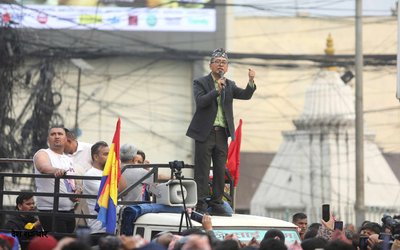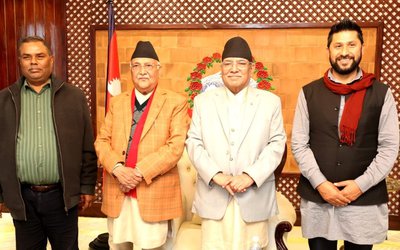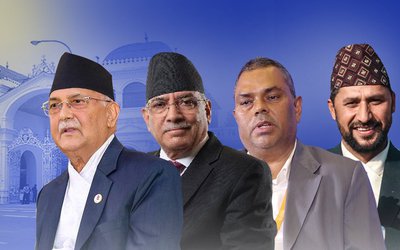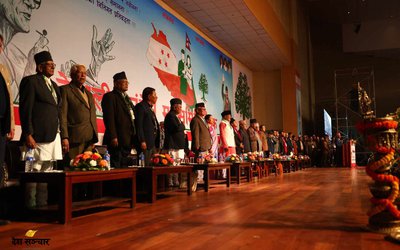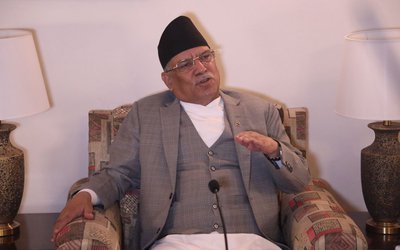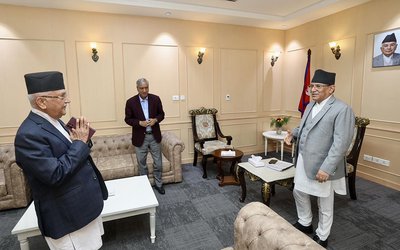Although the meeting was summoned by prime minister Pushpa Kamal Dahal to find out a way to end the current political deadlock by agreeing to announce the date of local elections, the meeting of three major forces, Maoist Center, Nepali Congress and Samyukta Loktantrick Madheshi Moracha (SLMM), ended on Monday 30 January with bitter disputes on whether to call the local bodies elections or to jointly move a constitution amendment bill.
With so many different political priorities and interests, any political breakthrough to settle the differences in the near future is unlikely.
As in the past, a three-hour marathon meeting at Baluwatar heard the leaders presenting their party's priorities concerend. For Nepali Congress, the priority is local body election, which will pave the change guard in government. SLMM’s priority is to amend the constitution by incorporating its seven-point demand.
Benefitting from the prolonged political disputes, Maoist-Center’s priority is to continue the current political deadlock, be it by amending the constitution or holding the elections.
Although CPN-UML leaders have been insisting on the local elections and other two elections by January 2018, they too want the deadlock to continue until a time that will help the party grab the power again.
If the political disputes intensify, there is a chance to break the coalition. CPN-UML is waiting the proper time to crack the coalition and be part of the other coalition. CPN-UML is getting the lion's share in the appointment of judges and other heads of constitutional bodies. Disputes among the three parties and CPN-UML leaders are benefiting by harping the election agenda in public.
Despite passing the five acts for local elections, with the report of the Local Bodies Restructuring Committee, Maoist Center finds itself in a safe position by not announcing the elections and hanging the constitutional amendment bill in uncertainty.
As politics needs no hurry, prime minister Dahal posed three questions to SLMM leaders to satisfy Nepali Congress leader Sher Bahadur Deuba and to test the mood of SLMM.
Dahal knows that his three questions will be likely to trigger disputes between Nepali Congress and SLMM. His questions include: What will be their reaction if the government makes preparations for the election and announces the date after completing the process for constitution amendment. Will they participate in the elections even if the parliament rejected the amendment bill? Whether or not the agitating parties will be ready for local polls if some reasonable changes are made to the report of the local level restructuring commission in line with their demands?
SLMM leaders headed by Mahant Thakur rejected local elections before amendment of constitution outright. Other Madheshi leaders Rajendra Mahato, Upendra Yadav and Keshab Jha backed Thakur, blaming the ruling Nepali Congress and Maoist Center as toeing the line of CPN-UML.
“We have clearly put forth our demands. But we are not in a position to suggest you any solution. You are the ones who have to come up with solutions. As we have been protesting against the constitution for long, we cannot agree on announcing the election date until the constitution is amended,” said Tarai-Madhes Democratic Party (TMDP) chairman Mahantha Thakur.
These questions have intensified the disputes among the three parties. “Nepali Congress and Maoist Center are no different than CPN-UML. Let's break the alliance,” said Rajendra Mahato. “Three major parties agree to share the position in judiciary and other appointments, why cannot they stand together for constitution amendment?" asked Mahato.
As agitating Madhes-based political parties are rigid on their stand on constitution amendment and ruling parties are in a hurry to hold the three elections by January 2018, a political backlash seems to be inevitable, with no immediate sign of easing the knotty politics.
The prime minister informed the Madhes-based leaders that the ruling coalition is ready to address their demand for making further changes to the amendment bill on the issues of language of official business and removing village council chairperson, vice chairperson, municipality mayor and deputy-mayor from the Electoral College, which elects members of the National Assembly.
“There is no alternative to amending the constitution before announcing the election date. If the government and major parties decide to head for elections without amending the constitution, we’ll not only boycott the election but also disrupt it. We’ll be compelled to resume our protests and it could invite a situation where no state institutions other than army and police could function in the Madhes districts,” Thakur warned.
Summoned to create the conducive environment to hold the local elections and amend the constitution, the three-hour long meeting ended with disagreement.

Keshab Poudel
Poudel is the editor of New Spotlight Magazine.
- ECONOMY: Growth At 3.3
- Apr 16, 2024
- DPM’s SHRESTHA’S CHINA VISIT High Profile, Low Key
- Apr 14, 2024
- Maha Kumbha In Barahkshetra: A Sacred Festival In Sacred Koshi (Kaushiki) River
- Apr 09, 2024
- LOSS AND DAMAGE: Upper Tamakoshi A Case
- Apr 02, 2024
- Helvetas-Nepal’s InElam Promoting Herbal Oil In Sarlahi
- Mar 31, 2024

